Karunanidhi was convinced that using the 2G cases against the DMK and reopening the fodder case against Lalu Prasad Yadav were products of the Congress leadership's short-sightedness.
A revealing excerpt from A S Panneerselvan's Karunanidhi: A Life.
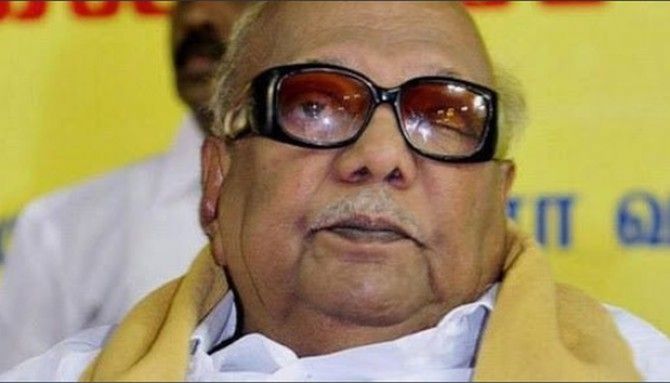
May 2007 should have marked the high point of Karunanidhi's public life, on his completing fifty years as a legislator.
There was a special assembly session on 11 May, followed by a public event at the Island Grounds.
The gathering of national leaders to felicitate Karunanidhi notwithstanding, the growing factional fights in the DMK could no longer be papered over.
These tensions took an ugly turn in May 2007. Dinakaran, a Tamil daily owned by the Maran family, carried a survey 'Makkal Manasu' (What People Think) on two politically sensitive subjects.
The Marans maintained that there was a dividing line between their ownership of the newspaper and its survey, which was conducted by A C Nielsen, an assertion that failed to convince most DMK cadres.
The first survey published on 7 May 2007 talked about who was the most effective central minister from Tamil Nadu. The survey had given Dayanidhi Maran the highest ranking and showed other ministers in a poor light.
The poll had Dayanidhi Maran ahead with 64 per cent of the respondents favouring him. Union finance minister P Chidambaram got 27 per cent; minister of shipping, road transport and highways, T R Baalu 7 per cent; and minister for health and family welfare, Anbumani Ramadoss and others 1 per cent each. The PMK cadre burnt copies of Dinakaran in several places.
Karunanidhi told the assembly on 10 May that Dinakaran had published the poll of 7 May, despite his sending word to the daily's office not to conduct such a poll. Karunanidhi said he was 'puzzled' by the timing. He added that when he saw the advertisements in Dinakaran about A C Nielsen's 'mega survey', he wondered what the need was for it at that point; he feared that it would create unnecessary problems.
Within days, the next survey appeared -- on Karunanidhi's heir -- this one giving M K Stalin a clear lead, with Karunanidhi's daughter, Kanimozhi, and his elder son, Alagiri, getting minimal votes.
The supporters of Alagiri went on a rampage and set fire to the Dinakaran office resulting in the death of three of its workers.
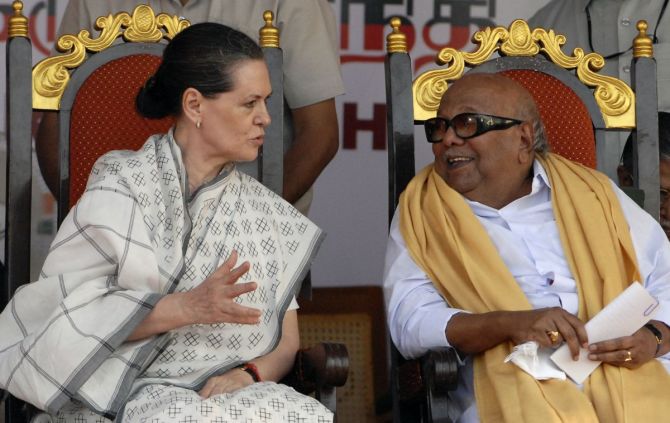
Karunanidhi distanced himself from the Marans and spoke about the incident emotionally in 2008. He said: 'When Alagiri and Kanimozhi had not engaged in any attempt to claim to be my heir, such surveys giving them 2 per cent chance were published with malicious intent. I never dreamt that these two children [Maran brothers], whom I brought up, will act against me.'
Karunanidhi ordered the resignation of Dayanidhi Maran from the Union Cabinet. Environment and forests minister A Raja replaced Dayanidhi Maran as Union minister for communications and information technology.
Surprisingly, Karunanidhi failed to condemn Alagiri for the violence that claimed three lives. For party seniors, this was unbecoming of such an iconic leader and statesman.
But the changes did not stop there. On 8 June 2007, Kanimozhi, who till that point was seen as Karunanidhi's literary heir, was inducted as a Rajya Sabha member.
To counter the Maran brothers, Karunanidhi launched a rival TV channel, Kalaignar TV, on 15 September 2007.
Alagiri was placated with a party post, first as south zone secretary for the DMK, followed by the chance to contest the Lok Sabha polls in 2009 from the prestigious Madurai constituency. On his victory, he was inducted into the Union Cabinet in 2009.
The 18-month public standoff between the Karunanidhi and Maran families came to an end when the patriarch promised the Central Madras seat once again to Dayanidhi Maran on 1 December 2008.
****
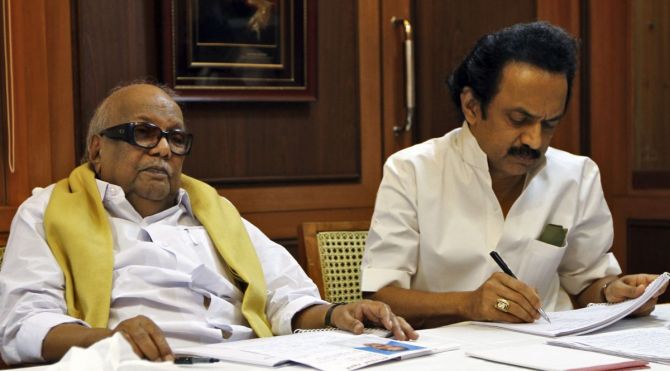
When Karunanidhi put forth Alagiri's name for the Union Cabinet, there was palpable public anger in Tamil Nadu. This grew when citizens learnt that out of the three Cabinet berths offered by the Congress, two went to his family -- Alagiri and Dayanidhi, and the most senior member, T R Baalu was left out in the cold.
Each passing day led to the erosion of Karunanidhi's reputation and eminence. Given the gravity of the earlier charges of dynastic politics and nepotism, Karunanidhi's demand for fair representation for the state failed to get its due even in Tamil Nadu.
Karunanidhi's troubles did not stop with this. This was also the time when various ministries in Delhi were working against one another and there were systematic leaks of various sorts of information.
Two leaks which hurt Karunanidhi were that of the Radia Tapes and the Comptroller and Auditor General report on 2G spectrum, which put the notional loss to the national exchequer at 176,000 crore rupees.
It remains a mystery which ministry -- finance or home -- had ordered the tapping of phones and who leaked these conversations to the media. The Indian government in 2012 filed a report in the Supreme Court saying that it has been unable to find the source which leaked the tapes containing conversations between corporate lobbyist Niira Radia and others, and it refused to say which arm of the government ordered the tapping.
One hint came from an article by former deputy editor, India Today, Dhiraj Nayyar, in the issue dated 17 December. He wrote: 'Since the highly selective leaks are Tamil-centric, the finger of suspicion moves towards the home ministry. The revelations could ensure the defeat of a once-impregnable DMK in the assembly elections of 2011. The Congress stands to gain from the DMK's decline.'
The second hint came from Home Secretary G K Pillai's interview to the Wall Street Journal, where he appeared to claim to have full knowledge of the contents of all the tapes.
Till then it was believed that only the income-tax department, which conducted the phone tapping, had full access to the tapes. However, when the issue came up before the Supreme Court, Mr Pillai said he was misquoted.
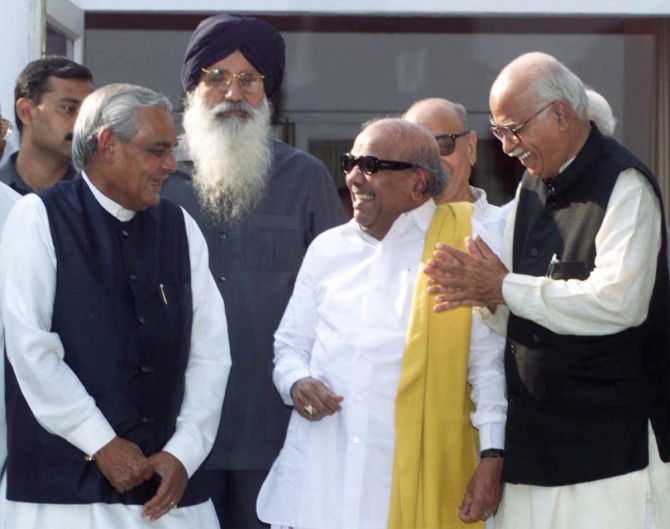
The Radia Tapes episode painted both the DMK and Karunanidhi in a bad light. Within weeks of the Radia Tapes episode, the second leak happened. It was the CAG report on the 2G spectrum that said the national exchequer lost nearly Rs 1.76 lakh crores due to a flawed allocation method adopted by telecommunication minister A Raja.
The 2G spectrum case took a huge toll on not only Karunanidhi's standing as a statesman but also as a private person, as he had to witness the incarceration of his daughter Kanimozhi.
Kanimozhi was arrested on 21 May 2011, two weeks after Karunanidhi lost power to Jayalalithaa. On 14 November 2010, Raja resigned from the Union Cabinet following the uproar over the CAG report.
By next July, Dayanidhi Maran, who was the minister for textiles, resigned following the CBI inquiry into the Aircel-Maxis case.
While the charges of corruption took a toll on the party and the reputation of Karunanidhi, the leadership stood firmly behind Raja.
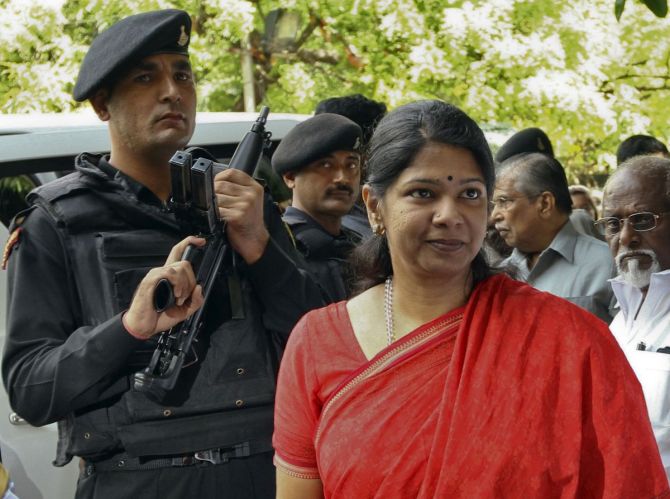
The reading of the DMK leadership was that the conspiracy against Raja and the DMK was many-sided, and there was a convergence of interests to paint the DMK black.
They were: The corporate tussle between the Global System for Mobile Communications (GSM) operators such as Airtel, Vodaphone and Idea, and the Code Division Multiple Access (CDMA) companies such as Tata Telecom and Reliance Telecom; the interest groups that for a decade had said that there was no additional spectrum for new licences; bringing in new players with technological prowess such as Russia's Sistema, Norway's Telenor, UAE's Etisalat and Japan's NTT DOCOMO created a new sense of insecurity among the existing players.
Further, the Congress felt that if the DMK in Tamil Nadu and the Rashtriya Janata Dal in Bihar could be subdued, it may pave the way for the revival of the party’s fortunes.
Karunanidhi saw the entire 2G episode, starting from the leak of the CAG report to the weak defence put forth by Congress leaders as politically motivated moves.
In an interaction with me, Karunanidhi asked: 'Can anyone explain how my wife Dayalu Ammal and my nephew Amirtham, both directors of Kalaignar TV, were witnesses in the CBI case and were accused in the Enforcement case. What is the logic for one agency to assign my wife and nephew as prosecution witnesses, and for another official agency to treat them as accused in the same case?'
At a personal level, Karunanidhi was convinced that using the 2G cases against the DMK and reopening the fodder case against Lalu Prasad Yadav were products of the Congress leadership's short-sightedness that paved the way for Narendra Modi and the BJP to come to power.
This was precisely the juncture when the DMK needed articulate members to defend the party in Delhi.
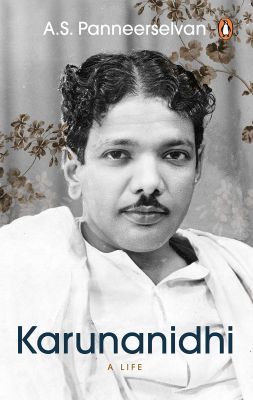
But Karunanidhi had to be content with Alagiri, who neither had the inclination nor the capability to do so. While the attack on the DMK was led by the official auditor of the country, and strictures were passed by the Supreme Court of India, the DMK's presence in the Union Cabinet was Alagiri and his equally inept supporters such as D Napoleon and S Gandhiselvan.
Why did the DMK's senior leaders permit the slide? What prevented them from expressing their views openly to prevent the catastrophe?
Many senior leaders say that if Karunanidhi had followed the rule of gradual progress, a rule which he effectively adopted for Stalin, for Dayanidhi Maran, he would have faced none of this ignominy.
They are convinced that had Dayanidhi Maran been inducted as minister of state, there would have been no Dinakaran survey; no burning of a newspaper office; no Alagiri factor; no Kalaignar TV and hence, no nightmarish allegation of the 2G scam. But this is shifting all the blame on to a single factor.
It is important to understand the impact of the charges of nepotism, family rule and corruption on the party.
Karunanidhi, who sensed that the tide had turned against the DMK in 2011, could not really explain the reasons for this sea change.
What contributed to the AIADMK's victory in 147 of the 160 seats that it contested, with margins ranging from 10,000 to 73,000 votes?
Why did the DMK offer 63 seats to the Congress, which managed to win just five?
One must also remember that if Karunanidhi bettered Jayalalithaa in devising electoral strategies during the 2009 Lok Sabha elections, she paid him back with interest in the 2011 assembly elections.
Jayalalithaa's virulent attacks during the election campaign on the domination of Karunanidhi's family members in Tamil Nadu's polity hit home.
Excerpted from Karunanidhi: A Life by A S Panneerselvan, with the kind permission of the publishers, Penguin Random House India.

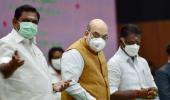







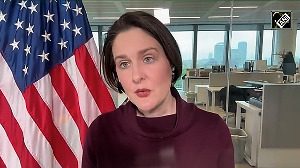

 © 2025
© 2025